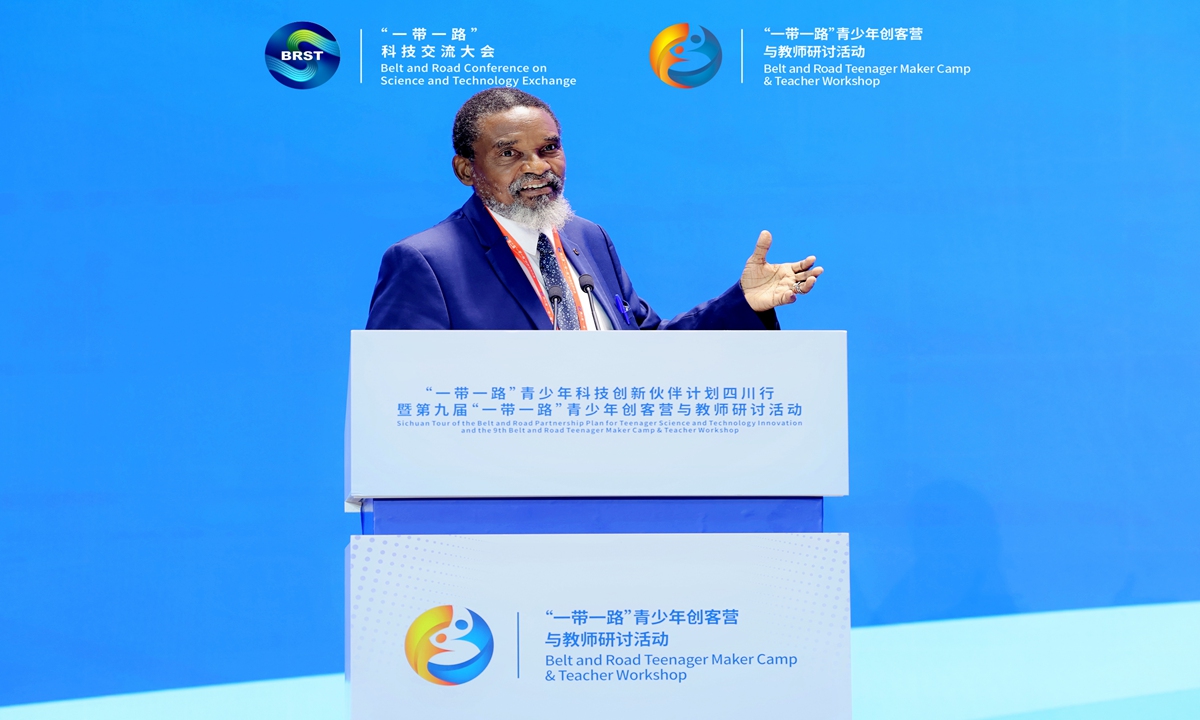Belt and Road STEM education seen as key driver for youth empowerment in Global South: Beninese scholar

Mahouton Norbert Hounkonnou Photo: Zhang Yiyi/GT
"This is my second time attending this event," Mahouton Norbert Hounkonnou, president of the Network of African Science Academies (NASAC) and member of the Belt and Road International Science Education Coordinating Committee (BRISECC) from Benin, told the Global Times during the 9th Belt and Road Teenager Maker Camp and Teacher Workshop held in Chengdu, Southwest China's Sichuan Province from Tuesday to Sunday.
"Last year, it was held in a different city, and I was impressed by how the initiative continues to grow and evolve. The significance of this event lies not only in showcasing young talent, but more importantly, in fostering international collaboration and mutual learning in science, technology, and innovation (STI)."
"China has a long and rich tradition in science and technology, and today it stands among the world's leading countries in these fields," he said. "From electronics to AI, from smart agriculture to digital infrastructure, Chinese innovations are visible and impactful. As participants from developing countries, we have much to learn from China's experience."
Hounkonnou said that the path China has taken - from a largely agrarian society to a global hub of innovation - offers inspiration to many countries in the Global South. "Fifty years ago, China was facing challenges similar to those we face today in Africa. Yet it transformed itself through strategic investment in education, infrastructure and technology. That transformation is a powerful reference," he said.
Beninese scholar noted that today's most pressing challenges - climate change, health crises, food insecurity, and access to quality education - are global in nature. "These problems have no borders. They don't care about geography, race, or language. The only way forward is international cooperation. That's why platforms like this camp are vital."
Education, he said, is the foundation of national development. "Without education, there is no future. And without empowering youth, there is no progress. We must invest in the next generation - not just with funds, but with vision, knowledge and opportunities."
He emphasized the importance of academic exchanges and science and technology diplomacy. "We need more exchanges between African and Chinese students, more joint research programs, more shared innovation projects. Science must be inclusive, equitable and democratic. In this context, China has shown real openness in collaborating with the Global South."
Speaking on technological gaps, he pointed out that Africa lags behind in key areas like artificial intelligence and smart agriculture. "But China's progress in these sectors gives us a roadmap. Through partnerships, training, and technology transfer, African nations can leap forward. The spirit of cooperation we see here is the key to making that happen."
"Science and innovation are not luxuries - they are necessities. They are essential to achieving the UN Sustainable Development Goals," he said. "Science is a global public good. If only a few countries monopolize it, the world cannot move forward fairly."
On the Belt and Road Initiative (BRI), Hounkonnou expressed strong support. "The BRI is a powerful platform that has brought tangible benefits to many African countries. Infrastructure, energy, education, digital connectivity - these are not just ideas, they are becoming reality on the ground."
In response to claims from some Western countries portraying the BRI as a "debt trap," Hounkonnou said that "such narratives are driven by geopolitical competition, not facts. Our countries have cooperated with the West for decades - yet poverty and inequality persisted. China, in contrast, has delivered roads, hospitals, schools, and skills training. The difference is visible."
"Let us be clear," he added. "In geopolitics, only interests count. We must choose partners based on our development needs, not foreign perceptions. China respects Africa. It listens, it builds, and it stays. That is something we deeply value."
Looking ahead, Hounkonnou expressed hope that the Belt and Road Teenager Maker Camp would expand its reach and impact in the years to come. "It would be highly beneficial if more African countries could participate in this platform. Exposure to advanced labs, hands-on innovation, and cross-cultural teamwork has a lasting impact on our students and teachers alike."
He suggested the establishment of more structured exchange mechanisms under the Belt and Road framework, including joint research centers, faculty training programs, and long-term scholarships. "China has built a strong model of STEM education, integrating theory with application. If we can replicate even part of this success through sustained collaboration, it will mark a turning point for science education in Africa."
He emphasized the need for inclusive and equitable participation in science. "STI should be open, democratic, and respectful of equity," he said. "Scientific collaboration must serve all countries fairly and create opportunities that reflect shared interests and responsibilities."
Hounkonnou reiterated that science must serve humanity as a whole, not a privileged few. "The scientific community should act beyond politics. Shared knowledge, open access, and respectful partnerships are what will lead us toward real solutions - whether it's climate adaptation, food systems, or epidemic response."
He reaffirmed that the BRI, particularly in the realm of science education, offers a vision of shared growth that is rooted in solidarity rather than domination. "We are not here to compete - we are here to collaborate. The success of one country should be seen as a resource for others, not a threat. That is the spirit I see in China's approach to cooperation with Africa."
Source: https://www.globaltimes.cn/page/202506/1336204.shtml
